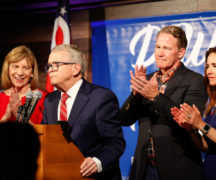Ohio Capital Journal
When Henry Frillman stood alone in 1920 as the only remaining Ohio lawmaker who served in the Civil War, it was assumed he would be the last to hold that distinction.
Little did newspapers know that two years later, fellow Civil War veteran Joseph Ebright would wait until his mid-70s to jump into state politics.
Ebright would outlive Frillman and go on to be the last soldier of the war to serve in the Ohio General Assembly. Both men made incredible impacts on their communities during their lifetimes. Here are their stories.
A singer to presidents
Henry William Frillman was only 7 years old when he made his public debut as a singer. When he decided to enlist in the 6th Regiment, Ohio Volunteer Infantry, Frillman took his talents to the battlefield.
A letter documented by the Ohio History Connection notes that Frillman was “beloved in his company and regiment for his correct bearing and soldierly behavior.”
Frillman and three others later sang for General Ulysses S. Grant at various times during the war.
After the war, Frillman returned to Columbus and joined a Glee Club made up of Republican singers. They wound up singing at the inauguration of several Ohio politicians who became president, including Grant, Rutherford B. Hayes, James Garfield, Benjamin Harrison, William McKinley and William Howard Taft.
One of Frillman’s earliest inaugural trips to Washington, D.C. would prove to be the most exciting. The Glee Club attended Grant’s second inauguration in 1873, and the president recognized Frillman from the war a decade earlier. Grant reportedly invited Frillman to the White House for dinner.
Frillman went on to work as a clerk in the Ohio Secretary of State’s office, then as a clerk in the governor’s office. He served a term as Franklin County recorder from 1915-17, then was elected to the state legislature.

detailed an odd session
of the Ohio General Assembly.
In 1920, at 77 years old, Frillman was the oldest lawmaker in Columbus.
The following year, he was involved in what newspapers called “one of the briefest sessions in the history of Ohio legislatures.” One Wednesday evening, Speaker Pro Tem C.C. Crabbe called the Ohio House of Representatives to session (using his bare knuckles in place of a gavel) — with the only other legislator present being Frillman.
The clerk read the journal. Frillman offered no corrections. He then stood and made a motion to adjourn until the following morning. Crabbe put the motion to a vote, and Frillman voted “aye.” Crabbe knocked on his desk again and declared the session adjourned.
“It is hardly probable that in the future any other veterans of the Civil War will feel like entering a political campaign,” the Bucyrus Evening Telegraph reported in November 1920, when Frillman was the only such member in the legislature.
Several years later, though, Joseph H. Ebright ran for office at the age of 75 and won a seat representing Tuscarawas County.

the death of state Rep.
Henry Frillman in 1924.
The two veterans served together for about a year, until Frillman died in January 1924 at the age of 80. Ebright attended his funeral.
From the battlefield to the state capitol
Ebright has one of the most remarkable life stories of any Ohio lawmaker in the state’s history.
His father was killed in a coal mine accident when Ebright was a child. He worked on a farm in rural Noble County until age 15, when he decided to run away and enlist in the Union Army, according to a lengthy biographical obituary for Ebright published in the New Philadelphia Daily Times in 1932.
He fought in the bloody Battle at Cumberland Gap and joined General William Sherman’s “March to the Sea.” At the battle of Kennesaw Mountain, he was shot in the chest and lay injured so severely that he was initially reported as dead.
Following his war service, Ebright at various times studied and practiced law in Indiana; explored Mexico and South America; mined gold in Colorado; studied machinery work while living with the sheriff in Stark County, Ohio; and served as city councilman in Dover.
While living in Canton, he attended a bible study class that happened to be taught by future governor and president William McKinley. That connection would prove fortuitous, as it later led him to receive appointment for an examiner position with the state of Ohio.
At the age of 75, Ebright was elected to his only term in the state legislature. His biggest achievement was securing state funding to create the Schoenbrunn Historical Association. Schoenbrunn, located in the area of New Philadelphia, is recognized as one of the first settlements in Ohio. His devotion to the project led to the purchase of 24 acres of former Schoenbrunn land to help create a state memorial park there.
Ebright died at 85 years old in 1932.





